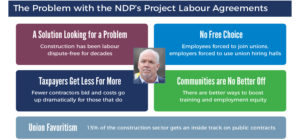 Vancouver (July 16, 2020) – The NDP government’s labour rules for building key public projects infringe on the Charter rights of the vast majority of B.C.’s construction workers and are driving public infrastructure costs way up, according to a coalition of B.C.’s largest construction associations and progressive unions. Delays and cost overruns on the first projects built using B.C.’s Community Benefits Agreement (CBA) are costing taxpayers an extra $384 million.
Vancouver (July 16, 2020) – The NDP government’s labour rules for building key public projects infringe on the Charter rights of the vast majority of B.C.’s construction workers and are driving public infrastructure costs way up, according to a coalition of B.C.’s largest construction associations and progressive unions. Delays and cost overruns on the first projects built using B.C.’s Community Benefits Agreement (CBA) are costing taxpayers an extra $384 million.
The coalition resumes its legal challenge today as it asks the B.C. Court of Appeal to reverse a lower court decision that referred part of the case to the Labour Relations Board, and to return the entire case to the B.C. Supreme Court to be adjudicated on its merits.
The coalition’s case has been, and will continue to be, about Transportation and Infrastructure Minister Claire Trevena ’s decision – her statutory discretion – to impose an unfair and discriminatory policy on the construction industry. It is not challenging the collective agreement embedded in the CBA or any other issue within the jurisdiction of the LRB.
“Right now, government and industry should be working together to rebuild the economy,” said Chris Gardner, President of the Independent Contractors and Businesses Association. “That’s a lot harder to do when public infrastructure dollars are not going anywhere near as far as they should.”
Today, the coalition tallied the known public costs of the Horgan government’s skewed CBA, which is now $384 million and counting. That’s the equivalent of as many as five new schools or one new hospital, or 3,000 affordable housing units.
“The government’s so-called CBA is unfair, unethical and completely out of step with the times,” said Paul de Jong, President of the Progressive Contractors Association of Canada (PCA). “As the pandemic drives the province further into debt, this government should be working to stretch public infrastructure dollars, not waste them.”
The coalition argues that the NDP government’sCBA policy, devised for the sole purpose of benefitting its BTU cronies, violates the rights of 85 percent of B.C.’s construction workforce.
“We believe this government knew full well that it was violating workers’ basic rights, including freedom of association, when it inflicted its CBA on our industry,” said Ryan Bruce, B.C. Manager of Government Relations for CLAC, which represents over 11,000 workers in B.C., many of whom would be forced to change their union membership in order to work on key public infrastructure projects. “No government should have the authority to dictate which union workers belong to.”
“If this government truly wants to champion workers and worker rights, then its CBA should be scrapped,” said Ken Baerg, CWU Director of Labour Relations, one of the progressive unions challenging the provincial government’s Community Benefits Agreement (CBA). “It’s time to come up with an arrangement that’s fair for all workers, companies and British Columbians.”
“If the NDP government continues to impose its CBA on public infrastructure projects, construction costs will spiral upwards and, ultimately, leave government with four options: to build fewer projects; reduce the scope of projects; increase taxes to pay for the projects; or incur debt to build them,” said Fiona Famulak, President of the Vancouver Regional Construction Association. “At the end of the day, B.C.’s taxpayers will bear the brunt.”
The B.C. Court of Appeal will hear the coalition’s arguments today and tomorrow.
“As we face the future of COVID-19 no one knows for certain what will happen. All we can do is control what is within our ability to control, and this spending on the CBA is entirely optional, it doesn’t add value” says Chris Atchison, BC Construction Association President. “Such wasteful spending at a time when the Minister of Finance is repeatedly stating the need to “spend every cent wisely” is a blatant contradiction between words and actions. British Columbians deserve better.”
For further details on B.C.’s spiralling CBA costs, go to: www.moneywellwasted.ca
Four construction associations (the British Columbia Construction Association, the Vancouver Regional Construction Association, the Independent Contractors and Business Association (ICBA), the Progressive Contractors Association of Canada (PCA)) and two progressive unions (Canada West Union and CLAC) representing 85% of B.C.’s construction workforce, have joined the B.C. Chamber of Commerce, the Canadian Federation of Independent Business (CFIB) and several construction companies, professionals and workers in launching the lawsuit aimed at halting restrictive labour policies in B.C.’s construction industry.
